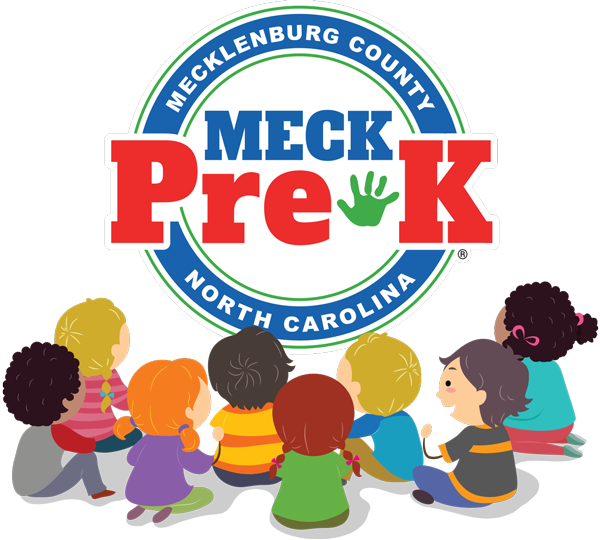At MECK Pre-K, play isn’t just a joyful childhood pastime—it’s a research-based cornerstone of our curriculum. Drawing on decades of evidence that early education sets the stage for both immediate school readiness and lifelong success, we integrate The Creative Curriculum®, a proven, hands-on, project-based framework, into every classroom experience. Educators use child-centered strategies, informed by ongoing assessments, to guide meaningful exploration while nurturing critical thinking, social-emotional skills, and foundational literacy. Through this intentional blend of research-backed structure and purposeful play, MECK Pre-K creates engaging, effective learning environments where children build the confidence, curiosity, and competencies to thrive.
- Play as the Heartbeat of Learning
At MECK Pre-K, play isn’t just the fun part of the day—it’s the foundation of learning itself. Rooted in The Creative Curriculum® for Preschool, our approach empowers children to become confident, creative, and caring learners by weaving together play-based, hands-on investigations with language, literacy, and math throughout the day.
This aligns with prominent research about pre-K learning. Researchers like the Institute of Education Sciences and the National Association for the Education of Young Children
have shown that guided and mutually directed play—when teachers support but don’t control children’s explorations—can significantly boost vocabulary development compared to purely child-directed play. This approach equips children with essential 21st-century learning skills like critical thinking, collaboration, and creative innovation.
- Unstructured Exploration: Open-Ended Play
Open-ended play grants children freedom—no fixed goal, no adult-scripted result—only exploration. When children build with blocks, paint, or invent worlds with cardboard boxes, they stretch their creativity, problem-solving abilities, language, and social-emotional skills. This unrestricted play is essential for brain development: research has found that free play correlates with stronger executive functioning, resilience, and even brain growth; its absence has been linked to long-term emotional and social difficulties. At MECK Pre-K, we make space for this kind of exploration every single day.
- The Classroom as the “Third Teacher”
The physical environment speaks volumes—and at MECK Pre-K, our classrooms are curated to inspire. Interest areas—like dramatic-play corners, science tables, or writing nooks—invite children to move, engage, and learn independently.
The Creative Curriculum® emphasizes the power of such thoughtfully designed spaces to spark curiosity and growth. IES research underscores that joyful, playful environments—where children feel welcome to explore and experiment—help them retain information more effectively and become more invested in learning.
- Building Friendships and Social Intelligence
Play is the arena where young children become social experts. As they navigate sharing, negotiating, and turn-taking, they foster empathy, cooperation, and a sense of belonging. IES research shows that play-based learning contributes to social and emotional development, giving children the tools they’ll need for confidence and competence in school and beyond.
At MECK Pre-K, every shared block tower or pretend-game scenario becomes a stepping stone to stronger interpersonal skills.
- Learning Beyond Academics
At MECK Pre-K, play is academic power in disguise. Our teachers weave literacy, math, and content knowledge seamlessly into everyday activities—whether through The Creative Curriculum® or playful “Mighty Minutes®” (short rhymes, songs, and movement breaks). Research supports this approach: playful, hands-on learning not only keeps children engaged, but also boosts long-term retention and enjoyment of learning—even more than direct instruction alone.
- A Foundation for Lifelong Growth
Play nurtures more than knowledge—it cultivates resilience, confidence, and adaptability. High-quality, research-based pre-K programs like MECK Pre-K support children in developing durable social, emotional, and cognitive skills. A balanced play-based approach—particularly one that includes guided or mutually directed elements—yields promising academic gains, especially in language development. Coupled with developmental insights from early childhood researchers, it’s clear: playful, intentional learning lays the groundwork for lifelong success.
- Realizing the Power of Play: At Home and in the Classroom
Play doesn’t stop when the school day ends—it’s a vital part of learning both in the classroom and at home. In MECK Pre-K classrooms, teachers design environments that act as “third teachers,” with inviting, age-appropriate activity areas that spark curiosity, encourage creativity, and promote independence. Families can build on this at home by offering opportunities for open-ended play—whether it’s art supplies, building blocks, or even a simple cardboard box. When children are given the space to explore, imagine, and create, they develop the skills and confidence they need to thrive. At MECK Pre-K, we believe every playful moment is a building block for lifelong success.
About MECK Pre-K
MECK Pre-K is a high-quality pre-K program open to all four-year-old children in Mecklenburg County at no cost to families. Classrooms are located in licensed childcare centers and taught by licensed teachers and highly qualified assistant teachers. You can apply online at MeckPreK.org.
Do you have a child who is not old enough for pre-K this year? Sign up for our email list and be notified when they’re eligible for MECK Pre-K. Simply go to MECKPrek.org/future-meck-pre-k-students and select your child’s age group.

